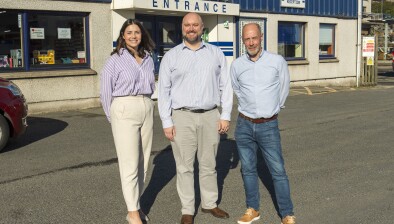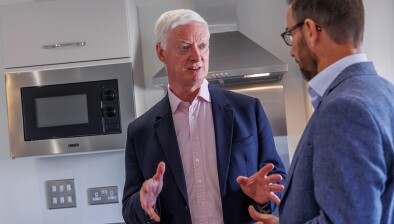SNIB invests £50m into Octopus Capital’s Affordable Housing Fund

(from left) Catherine Short, investment manager, affordable housing, Octopus Capital; Jack Burnham, head of affordable housing, Octopus Capital; Nicola Douglas, executive director, sustainable investment, SNIB; Rebecca Currie, associate director, sustainable investment, SNIB
Asset manager Octopus Capital has raised an additional £100 million for its Affordable Housing Fund, with the Scottish National Investment Bank (SNIB) providing £50m of the funding.
As an impact investor, aiming to secure both commercial returns and societal benefit, the bank’s funding is aligned to its mission to invest in places transforming communities and supporting people to thrive.
Octopus’ Affordable Housing Fund is focused on delivering high-quality, energy-efficient affordable homes across the UK. The fund invests in new-build developments, with a strong emphasis on social impact, community benefit, and sustainability.
In a first for the Fund and Scotland, the investment will introduce an intermediate rent tenure where both rent and energy costs will be discounted by around 20% compared to market renting. The Bank’s capital will all be deployed in Scotland and will enable a minimum of £100m to be invested in Scottish developments. The homes will also be offered to key workers on a first priority basis.
The remaining capital comes from a US public foundation, reflecting the Fund’s expanding global investor base and growing appeal to mission-aligned institutions.
The funding will also unlock more than 1,000 Zero Bills homes across England and Scotland, offering affordable and intermediate rental properties where residents won’t have to pay a penny for their home energy bill.
Launched in 2022, Octopus Energy’s Zero Bills is a world-first tariff lets customers move into homes packed with cutting-edge green tech – including a heat pump, a battery and solar panels – with no home energy bills for at least 5-10 years.
This fundraise follows the recent news of the Fund participating in the world’s largest Zero Bills scheme in Epping, Essex. This 113-home development will include a pioneering microgrid community. The Fund has acquired 35 of these homes through its for-profit registered provider of social housing, NewArch Homes. This will provide residents with significantly reduced living costs while cutting carbon emissions and setting a new benchmark for sustainable affordability.
Jack Burnham, head of affordable housing, Octopus Capital, said: “Our aim for this year was to double the size of our Affordable Housing Fund, and we’re so pleased to welcome our new investors into the Fund, enabling us to close in on our next £500m milestone. This new capital also presents a few exciting firsts; the investors are from new types of institutions to those in the Fund already, building our growing group of those looking for resilient income and long-term social impact.
“This also marks our first time investing specifically into Scotland and its discounted market rent housing. We’re hoping to transform communities there, providing energy-efficient, future-proofed housing to those that need it most.”
Nigel Banks, zero bills director, Octopus Energy, added: “For too long, people have had to choose between affordability and sustainability. Zero Bills homes remove that trade-off - they’re cheaper to live in, better for the planet, and powered by the latest clean tech. This investment into the Octopus Affordable Housing Fund means thousands more people will be able to move into homes where they won’t have to worry about home energy bills. It’s a game-changer for renters and homeowners alike.”
Nicola Douglas, executive director, sustainable investments, Scottish National Investment Bank, commented: “The Affordable Housing Fund is a brilliant example of the innovative approaches - to both securing capital and ensuring homes are affordable - that we need to deploy at scale.
“Octopus Capital’s approach to sustainable building and discounting both rent and energy takes a holistic approach to addressing cost-of-living pressures. We were also attracted to the Fund’s approach to regenerating sites, utilising local supply chains, and supporting social inclusion. We are delighted that our investment is helping unlock a further £50m through the Fund for Scotland.”







